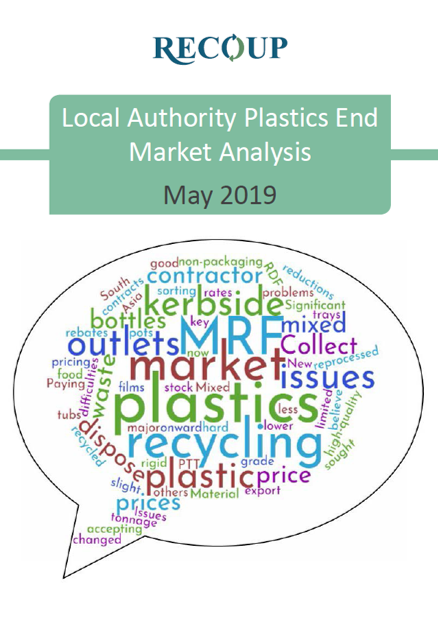A lack of reprocessing outlets for some grades of pots, tubs and tray (PTT) plastic is seeing material sent for incineration as RDF, plastics recycling organisation Recoup has claimed.
The statement comes following a survey of local authorities who were asked to provide details on plastics collections and end destinations for the plastics they collect from households.

Plastic pots, tubs and trays (PTT) are made from a variety of polymers, making recycling of the material complex
According to Recoup, more than half (52%) of councils responding to the survey said that they had experienced difficulties with plastics markets in recent months – particularly in light of a lack of demand for material from the Far East, which had previously been a large market for mixed plastic items from the UK.
The organisation adds that where there is a weak or limited market for material, local authorities have reported that they are moving plastics to energy recovery, refuse derived fuel (RDF) and solid recovered fuel (SRF) end destinations.
In the main, councils said that they had found that there is good demand for sorted bottle grades such as clear PET and natural HDPE bottles, while mixed grades containing a high proportion of these polymers are also in demand.
Prices paid for bottles have remained stable despite weakening values across other grades, including films and PTT due to a tightening market in the Far East, Recoup claimed.
Pots, tubs and trays
The picture for PTT is complicated as there are several different polymers used in pots, tubs and trays including PP, PET, PVC and PS. While there is demand for some types of material, others do not have established end markets.
According to Recoup, the PP – polypropylene – fraction of PTT, which makes up to around 40% of the PTT collected from households, is sought after by processors in the UK and mainland Europe. This material can be used in non-food packaging products including paint trays and plant pots.
UK processors including Biffa Polymers at its Redcar plastics facility and Lincolnshire-based Luxus are among those to reprocess PP in the UK, with a sorted PP grade attracting a value of as much as £180 per tonne.
However, kerbside collected PTT also comprises polymers such as PET (which makes up an estimated 50% of PTT), PS and PVC all of which are lacking in viable end markets and are therefore more problematic for councils and contractors.

Recoup surveyed local authorities to assess available end markets for material (Click on image to access report)
PET from PTT is more brittle than bottle grade PET, for example, and the recycling process generates significant yield losses from the material, meaning that it is not an attractive grade for reprocessors to handle.
The granulation and washing process developed for PET bottles is also too aggressive for PET PTT meaning it is not viable to process the PTT and bottle PET together.
Typically a mixed PTT grade will attract little value, unless there is a high proportion of PP or even bottles present, with local authorities telling letsrecycle.com that they are having to pay gate fees of up to £50 to sort the material at MRFs or PRFs.
As many as 80% of local authorities in the UK currently report offering some form of PTT collection in 2017 – with as much as 175,000 tonnes of the material collected from households.
Energy from waste
In its report, Recoup says: “The market price of plastics, and the ability to find a market, are the primary drivers for the materials that Local Authorities collect for recycling. With a weak, or limited market, some Local Authorities reported they are now moving some plastics to Energy Recovery, Refuse Derived Fuel (RDF) and Solid Recovered Fuel (SRF) end destinations.”
Additionally, Recoup says that while local authorities have reported an increase in consumer interest in recycling, consumers are increasingly presenting plastics for recycling that are not target material or not presenting them in an optimal way.
“The market price of plastics, and the ability to find a market, are the primary drivers for the materials that Local Authorities collect for recycling. With a weak, or limited market, some Local Authorities reported they are now moving some plastics to Energy Recovery, Refuse Derived Fuel (RDF) and Solid Recovered Fuel (SRF) end destinations.”
Local Authority Plastics End Market Analysis
Recoup
This could include presenting materials including excess food, unclean or top film not being removed from ready meal packaging.
“The current systems are not able to handle the diverse and complex nature of the material and therefore deliver high collection rates with premium material quality,” Recoup said, noting that some councils have reported considering switching to a ‘bottle only’ approach to plastic collections due to the market demand for material.
Commenting on the findings of the research, Steve Morgan, technical manager at Recoup, said: “The UK has a once in a generation opportunity to really grow its plastic recycling infrastructure and capabilities.
“Through innovation to create new and better markets, development of state-of-the-art recycling facilities to use recycled plastics in manufactured products, the UK can become world leaders in plastic resource management.”
The post ‘PTT plastic going to EfW’, Recoup claims appeared first on letsrecycle.com.
Source: letsrecycle.com Plastic



